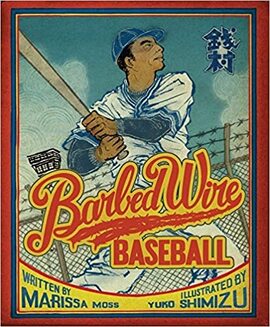|
My kids’ school values continuing education at home during any extended break. When my kids stepped off the school bus to start summer vacation last June, I knew to expect a dense packet of *suggestions* -- math exercises, reading response questions, fine motor control activities for the youngest children, and of course, an extensive reading list (printed on purple paper so we would be able to identify it easily). Trying to follow the teacher’s lead, I asked my literate children to circle the book titles that appealed to them. Then I requested a stack from our public library.
The kids and I had talked about World War II at times in the past (thanks to kids’ series like I Survived and Magic Treehouse, at one point I had a three-year-old asking me if Big Ben was bombed during the Blitz), but Japanese American families rounded up and forced into internment camps? What would my kids take away from this story? Would they develop prejudice against Japanese? Would they feel the sadness of this history? What kind of commentary should I add?
I read the story solemnly, including the afterword that provides more of a historical perspective. And I’m ashamed that I almost apologized for making them confront such a sad part of our country’s past. The urge to sweep it under the rug was something I had to fight in myself. Because we as Americans are different now, right? We have many Japanese friends. My kids can tell you that the fast train in Japan is called the Shinkansen. Why hold onto the hurt? People say kids surprise you. It’s true. They requested that book many, many times that summer. We renewed our borrowing time as long as we could. And they asked me questions. How many people were at the camp? What were the other camps like? What else did they do at camp besides play baseball? Having kids will make you keenly aware of how many times (a day) you have to say “I don’t know.” I told them I would request more books so we could learn together, but then life got in the way, as it so often does. This winter, one of my son’s asked again for “that book where they play baseball at camp.” It took me a minute to wipe the cobwebs from my memory, but I dug up the purple summer reading packet, located the title, and requested the library book once more. As it tends to do, history repeated itself, with my kids enjoying the story and asking questions, and that’s when I realized that I shouldn’t put it off any longer. There are times I really appreciate the marketing search functions that allow merchants to suggest materials -- if you liked this, you might also like… I found So Far from the Sea by Eve Bunting, Baseball Saved Us by Ken Mochizuki, and The Bracelet by Yoshiko Uchida. I braced myself with each reading, trying to read clearly through the tears that were easily coaxed from my eyes as I imaged the pain and suffering of these families, of the children. My kids didn’t cry. They heard stories of friendship and honoring family members, of remembering, of baseball and of school. They learned that it took the U.S. Government 46 years to apologize for their actions. They learned the U.S. Government apologized. They heard one Japanese father’s perspective: “Why did they put you and Grandmother...here?” [I ask] “Because Japan attacked the United States… It was a terrible thing. Suddenly we were at war. And we were Japanese, living in California. The government thought we might do something to help Japan. So they kept us in these camps.” “It wasn’t fair,” I say. “It was the meanest thing in the whole world. You were Americans. Like I am….” “It wasn’t fair that Japan attacked this country either. That was mean, too. There was a lot of anger then. A lot of fear. But it was more than thirty years ago, Laurie. We have to put it behind us and move on.” (So Far from the Sea by Eve Bunting) And yet, the father doesn’t move on from everything. He keeps alive the memory of his father who died in the camp. He teaches this history to his children as he teaches them to honor those who suffered. You, of course, are aware that these weren’t the only camps in World War II. Amazon also recommended titles about the Holocaust. Should I go there? Yes, I decided, I should. When we read The Whispering Town by Jennifer Elvgren about a Danish town that hid Jews and ferried them to Sweden, and when we read The Harmonica by Tony Johnston about a Jewish boy who survived camp by playing Schubert on the harmonica his father gave him before they were separated, my kids absorbed the details. They were as baffled as we are today by the hatred. And they were as grateful as we are today for those who helped. We have been listening to Schubert...appreciating the music...and remembering the way that boy gave his fellow prisoners hope during their time in camp. Apparently kids can handle it. I’m still left feeling uncomfortable that I don’t have all the answers. But I’m also left feeling grateful for the writers who share their personal stories with us, so we can cry and cheer and humble ourselves and hope with them.
0 Comments
Leave a Reply. |
Author's Log
Here you will find a catalog of my writing and reflections. Archives
December 2022
|
